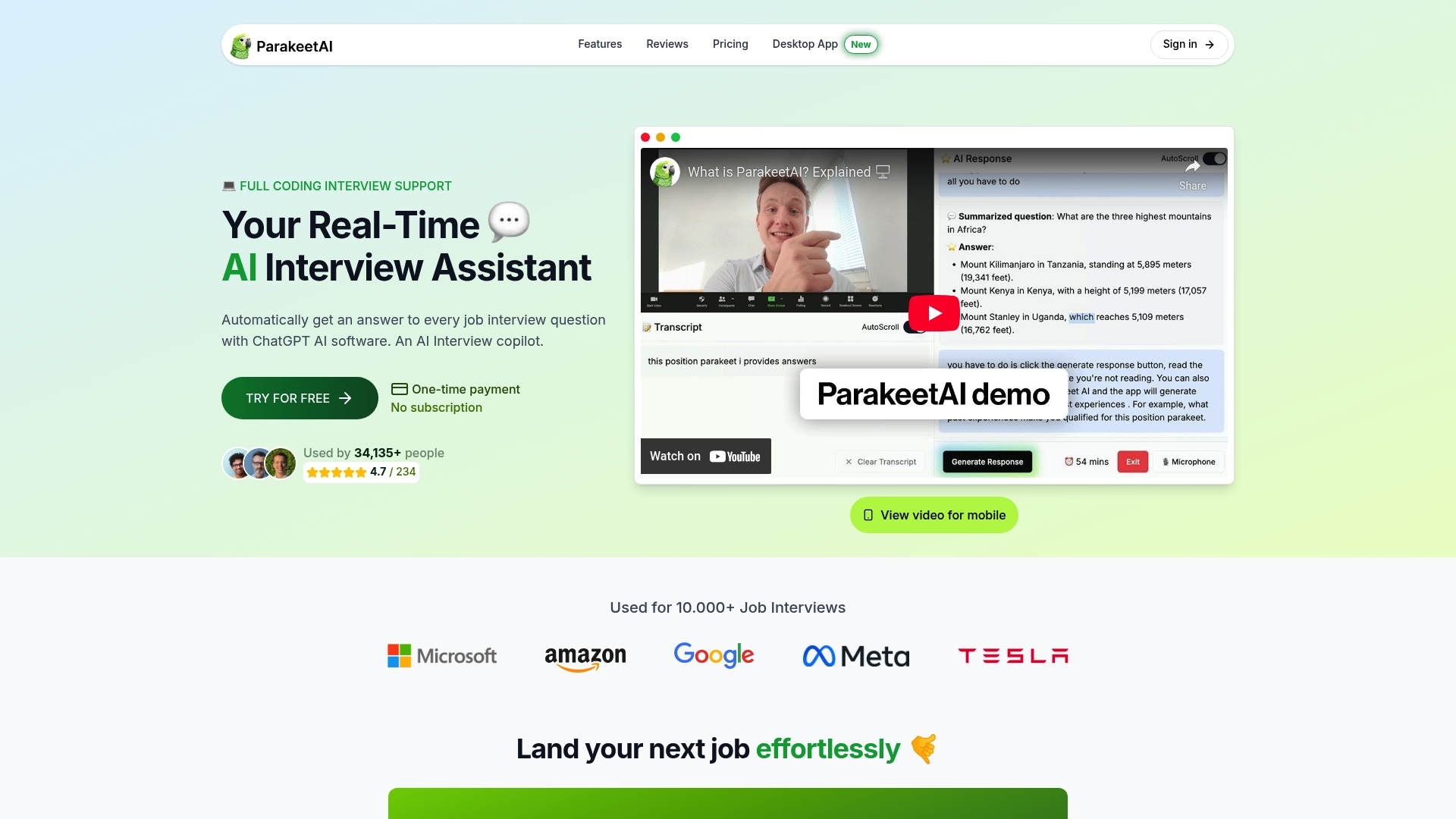Understanding the Benefits of AI in Job Search

Artificial intelligence is quickly changing how people look for jobs and make big career moves. More than 30 percent of companies now use AI-powered systems to filter, match, and recommend candidates. Some think these automated tools remove every ounce of human touch. The reality is AI is making job searches more personal and insightful than ever before.
Table of Contents
- What Is AI And Its Role In Job Search?
- Why AI Matters In The Recruitment Process
- How AI Enhances Job Matching And Recommendations
- Exploring The Personalization Of Job Searches With AI
- Real-World Applications And Future Trends Of AI In Job Search
Quick Summary
| Takeaway | Explanation |
|---|---|
| Leverage AI for tailored career recommendations | Use AI tools to receive personalized career path suggestions that align with your skills and aspirations. |
| Improve your resume with AI insights | AI can optimize your resume and LinkedIn profile for better visibility in applicant tracking systems. |
| Utilize AI for networking strategies | Implement AI-generated networking strategies to expand your professional connections effectively. |
| Practice interviews with AI tools | Engage with AI platforms for interview simulations to enhance your skills and confidence during job interviews. |
| Understand AI’s role in recruitment | Recognize how AI transforms recruitment by analyzing candidates more efficiently and reducing biases. |
What is AI and Its Role in Job Search?
Artificial Intelligence (AI) represents a groundbreaking technological advancement transforming how job seekers approach career opportunities. At its core, AI enables computer systems to perform tasks traditionally requiring human intelligence, such as learning, problem solving, and decision making.
Understanding AI in the Job Search Context
In the job search landscape, AI functions as a powerful tool that streamlines and enhances multiple stages of career exploration and application processes. According to Cornell University, AI can assist job seekers through various critical functions:
- Personalized career path recommendations
- Resume and LinkedIn profile optimization
- Networking strategy preparation
- Interview practice and skill assessment
The technology leverages complex algorithms and machine learning to analyze vast amounts of data quickly and accurately. This capability allows AI to process job descriptions, match candidate skills, and provide insights that would take humans significantly longer to compile.
How AI Transforms Job Search Processes
AI transforms job search processes by introducing unprecedented efficiency and precision. Research from the OECD Employment Outlook highlights AI’s ability to automatically categorize textual data like job descriptions into predefined skill categories. This technological approach enables a more nuanced translation of an individual’s professional background into a comprehensive profile of knowledge, abilities, and potential.
Through intelligent parsing of resumes, skills assessments, and professional profiles, AI can identify patterns and connections that might escape human recruiters. The technology goes beyond simple keyword matching, understanding contextual relevance and potential skill transferability across different industries and roles.
Below is a comparison table showing how traditional job search methods differ from AI-powered approaches across key job search and recruitment features.
| Feature | Traditional Methods | AI-Driven Methods |
|---|---|---|
| Candidate Screening | Manual resume reviews, subjective interpretation | Automated filtering, data-driven analysis, reduced bias |
| Job Matching | Keyword-based, rigid criteria | Contextual, dynamic skill mapping, adaptability considerations |
| Personalization | Generic advice, limited by human memory | Tailored recommendations, real-time learning and adjustment |
| Recruiting Efficiency | Time-consuming, higher cost-per-hire | Accelerated process, up to 30% cost savings |
| Data Processing | Limited scale, slower pattern recognition | Large-scale data analysis, quick identification of patterns |
| Interview Preparation | Standard preparation, manual coaching | Interactive AI simulations, instant feedback |
While AI is powerful, it remains a tool to augment human decision making rather than replace human judgment entirely. Job seekers who understand how to effectively leverage AI can gain significant advantages in a competitive employment market, using technology to highlight their unique strengths and potential.
Why AI Matters in the Recruitment Process
Artificial Intelligence has dramatically transformed recruitment strategies, offering unprecedented capabilities that address traditional hiring challenges and inefficiencies. By integrating advanced technological solutions, organizations can now streamline talent acquisition processes with remarkable precision and effectiveness.

Revolutionizing Candidate Screening
According to the Society for Human Resource Management, AI tools dramatically increase recruitment efficiency by automatically filtering viable candidates. This technological approach enables critical advantages:
- Reducing cost-per-hire by up to 30%
- Accelerating the overall hiring process
- Minimizing human bias in initial candidate evaluations
Traditional recruitment methods often involve manual resume reviews, which consume significant time and are prone to subjective interpretations. AI algorithms, however, can rapidly analyze hundreds of applications, identifying precise skill matches and potential candidate fit with unprecedented accuracy.
Enhancing Recruitment Precision
AI’s computational power allows for deep analysis of candidate profiles beyond surface-level qualifications. By examining comprehensive professional histories, educational backgrounds, and skill sets, AI can uncover nuanced connections that human recruiters might overlook.
The technology goes beyond simple keyword matching, utilizing sophisticated machine learning models that understand contextual relationships between skills, experiences, and job requirements. This approach enables more holistic candidate assessments that consider potential and adaptability, not just current qualifications.
Moreover, AI-driven recruitment tools can provide predictive insights about candidate performance, potential cultural fit, and long-term organizational value. By analyzing vast datasets, these systems can identify patterns and correlations that inform more strategic hiring decisions, ultimately helping companies build more dynamic and compatible teams.
How AI Enhances Job Matching and Recommendations
AI technology represents a transformative approach to job matching, moving beyond traditional linear recruitment methods by creating intelligent, dynamic connections between job seekers and potential employment opportunities. This advanced matching process leverages sophisticated algorithms to understand nuanced professional profiles and organizational requirements.
Intelligent Skill and Experience Mapping
According to the International Conference on E-Business, AI enables a sophisticated bilateral matching model that goes far beyond simple keyword comparisons. The technology analyzes multiple dimensions of professional expertise:
- Comprehensive skill set evaluation
- Professional experience contextual understanding
- Potential for role adaptability
- Career trajectory predictions
Traditional job matching relied on rigid criteria and manual interpretation. AI introduces a dynamic, intelligent approach that can recognize transferable skills, understand subtle professional nuances, and recommend opportunities that might not be immediately apparent through conventional search methods.
Personalized Job Recommendation Strategies
AI-powered recommendation systems create highly personalized job discovery experiences. By processing vast amounts of professional data, these systems can identify potential career paths that align with an individual’s unique skills, aspirations, and professional background.
The technology continuously learns and adapts, refining its recommendations based on user interactions, emerging job market trends, and evolving skill requirements. This approach transforms job searching from a static, time-consuming process into an intelligent, responsive journey of professional exploration.
Moreover, AI recommendations consider broader contextual factors like cultural fit, potential for growth, and long-term career alignment. By analyzing complex datasets, these systems provide job seekers with insights that extend far beyond traditional job board listings, offering a more holistic approach to career development and opportunity discovery.
Exploring the Personalization of Job Searches with AI
Personalization represents the cutting edge of AI-driven job search technologies, transforming how individuals discover and engage with potential career opportunities. By leveraging advanced machine learning algorithms, AI creates unprecedented levels of tailored career guidance and recommendation strategies.
Dynamic Skill Mapping and Career Alignment
According to Berkeley’s Career Market Research, AI-driven career guidance models offer comprehensive personalization through several key mechanisms:
- Real-time job market analysis
- Individualized career path recommendations
- Comprehensive skills assessment
- Predictive career trajectory modeling
Traditional job search methods treated candidates as static entities with fixed skill sets. AI introduces a dynamic approach that understands professional potential as an evolving, multidimensional profile. The technology can recognize emerging skills, predict future career trends, and suggest opportunities that align with an individual’s unique professional DNA.
Contextual Intelligence in Job Recommendations
AI personalization extends far beyond simple matching algorithms. Intelligent recommendation systems analyze intricate details of a professional’s background, including education, work history, skill transferability, and personal career aspirations.
These advanced systems create a holistic understanding of a candidate’s professional identity, considering factors like cultural fit, learning potential, and long-term career growth. By processing complex datasets and understanding nuanced professional contexts, AI can recommend opportunities that might be invisible through conventional job search methods.
The result is a profoundly individualized job search experience that adapts in real-time, providing job seekers with insights and opportunities precisely calibrated to their unique professional landscape. AI transforms job searching from a passive, reactive process into an intelligent, proactive journey of professional discovery and potential.

Real-World Applications and Future Trends of AI in Job Search
Artificial Intelligence continues to revolutionize job search strategies, introducing innovative technologies that transform how professionals discover, apply for, and secure employment opportunities. As the digital landscape evolves, AI applications are becoming increasingly sophisticated and integral to modern career development.
Current AI Job Search Technologies
According to the Brookings Institution, AI technologies are reshaping employment processes through multiple advanced applications:
- Automated resume screening systems
- Predictive analytics for job matching
- Personalized job recommendation platforms
- Natural language processing for candidate assessment
These technologies enable unprecedented levels of efficiency, allowing job seekers to navigate complex employment markets with greater precision and insight. By analyzing vast datasets, AI can identify patterns and opportunities that traditional job search methods would typically overlook.
Emerging Trends in AI-Driven Employment Solutions
Intelligent career platforms are developing more nuanced approaches to professional matching. These systems go beyond simple skill alignment, incorporating complex factors like cultural fit, potential for growth, and long-term career trajectory predictions.
Future AI job search technologies are expected to integrate more advanced machine learning models that can understand subtle professional contexts. This includes analyzing not just current skills, but potential for skill adaptation, learning capacity, and emerging industry trends.
The convergence of AI with other technologies like blockchain and advanced data analytics promises to create more transparent, efficient, and personalized job search experiences.
This table summarizes current and emerging AI applications in the job search process, highlighting their key functions and benefits.
| AI Application Area | Key Function | Main Benefit |
|---|---|---|
| Automated Resume Screening | Quickly parses and filters resumes | Saves time, reduces bias |
| Predictive Job Matching | Matches candidates to jobs using advanced algorithms | Higher fit accuracy, uncovers hidden opportunities |
| Personalized Recommendation Systems | Suggests roles and paths tailored to individual profiles | Improves relevance, adapts to user preferences |
| Natural Language Processing Analysis | Analyzes professional documents and responses | Deeper assessment of skills and fit |
| Real-Time Interview Assistance | Provides instant feedback and support during interviews | Increases confidence, improves performance |
| Skill & Career Trajectory Modeling | Predicts growth potential and future fit | Enables long-term planning, aligns roles with aspirations |
Gain an Unmatched Edge with AI-Powered Interview Support
The journey to landing your dream job is filled with fast-changing expectations. After reading about how AI optimizes job search and matching, you might still feel uncertain when it comes to interview performance. You have already learned that AI makes job searching efficient—but success depends on showcasing your skills during those critical moments. Real-time guidance and confident answers are exactly what candidates need to stand out in a competitive market.

You do not have to prepare alone. With Parakeet AI, you get a real-time AI job interview assistant that listens to your conversations and provides instant answers to every question. Take control of each interview and turn every opportunity into an offer. Visit Parakeet AI Job Interview Assistant now and get the advantage you deserve in your next interview.
Frequently Asked Questions
What is the role of AI in job searching?
AI assists job seekers by streamlining multiple stages of the application process, including personalized career recommendations, resume optimization, networking strategies, and interview practice.
How does AI enhance the recruitment process for employers?
AI enhances recruitment processes by automating candidate screening, reducing hiring costs, accelerating the hiring timeline, and minimizing human bias in evaluations.
Can AI provide personalized job recommendations?
Yes, AI-powered systems analyze individual skills and experiences to offer highly personalized job recommendations, adapting over time to market trends and user interactions.
How can job seekers leverage AI in their job searches?
Job seekers can leverage AI by using tools for optimizing their resumes and profiles, preparing for interviews with practice sessions, and following personalized job recommendations that align with their career goals.




